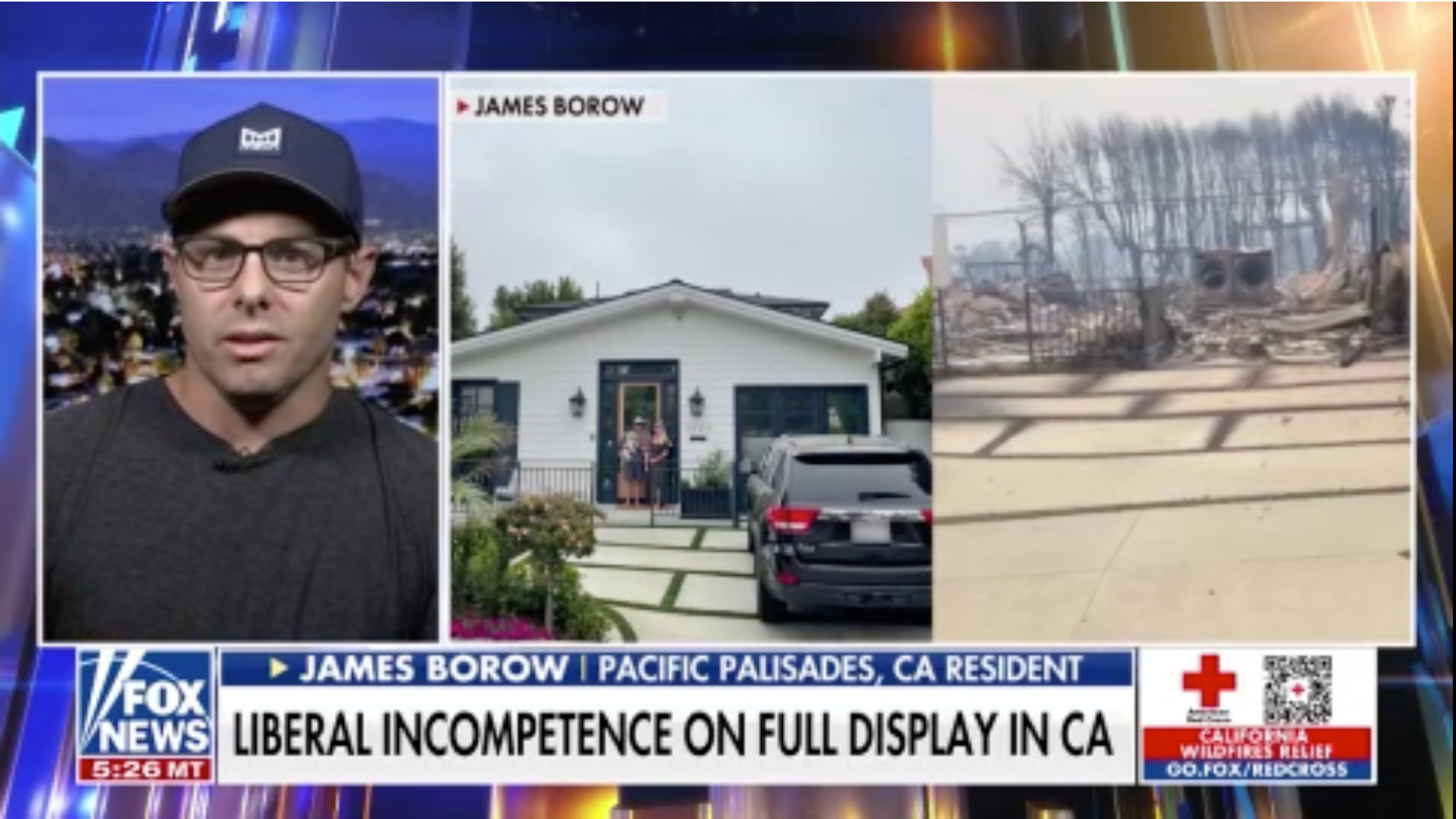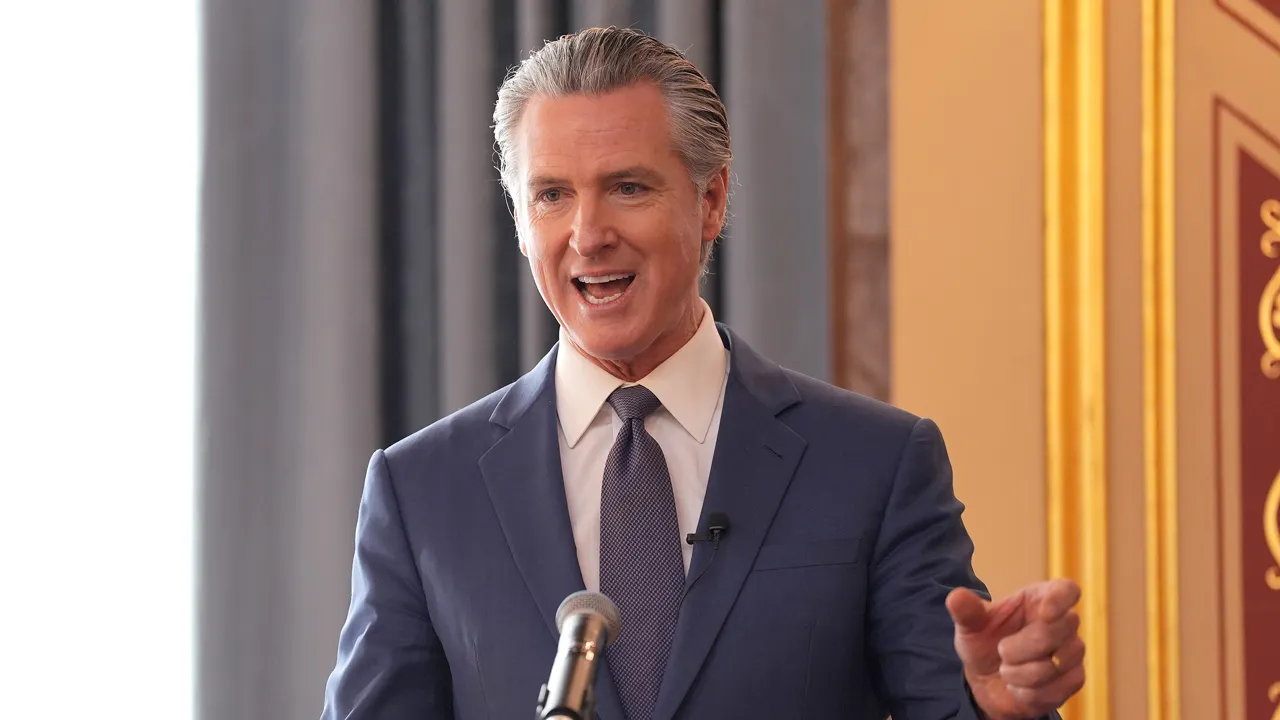West
LA failed residents to a 'catastrophic degree': California man whose house burned in wildfires

A California resident who lost his Pacific Palisades home in the wildfires is calling out city leadership, saying it failed residents “to a catastrophic degree.”
James Borow spoke to “The Ingraham Angle” after raging wildfires ripped through his southern California area, destroying residences, businesses and schools. Now, Californians are left to pick up the pieces.
“The Palisades is one of the most special places in the world, and I don’t blame, really, anyone that’s affiliated with the Palisades, but I think Los Angeles failed us to a catastrophic degree, and it just can never happen again,” he told Fox News on Thursday.
CALIFORNIA WILDFIRES: ESSENTIAL PHONE NUMBERS FOR LOS ANGELES-AREA RESIDENTS AND HOW YOU CAN HELP THEM
Borow recalled watching his home burn down through the camera system in his car while he and his family were away from the area.
“It took about an hour for the house to burn down, and there was no emergency services,” he said. “I watched it from the Las Vegas airport. It was without a doubt the most surreal experience of my life, but I’m just angry because I know it was avoidable. Everyone knew the winds were bad.”
He said city officials knew many residents did not have quality insurance, but that they still failed at responding to the tragedy.
“When 1,600 people in your town no longer have, basically, quality insurance, you would think you’d go ahead and check the water pressure, check the reservoir, make sure there’s fire trucks,” he said. “Like, just basic operational things failed.”
Borow described local government as functioning as a “facade.”
“They were playing government this whole time, and they had an opportunity to step up and help us in need and there was nothing there.”
Fires destroyed Borow’s “entire neighborhood.”
“I lived in an area called the Alphabet Streets — it’s totally decimated,” Borow told Fox News. “Like every single neighbor I have, their house is gone. I have a 5-year-old and a 3-year-old. My 5-year-old’s school is gone. The 3-year-old’s preschool is gone. The library is gone. The place they went to art class is gone. The place they went to music class is gone. The place they went to gymnastics is gone — like every single thing is gone.”
In spite of the devastation, Borow expressed hope in moving forward and rebuilding.
“We’re rebuilding. We’re doubling down. I love the Palisades. I think with good leadership, it can be incredible. We’re optimistic if there can be people who are competent running this place. There’s no reason it has to be like this.”
Read the full article from Here

West
Newsom staffer who told California reporter to ‘f— off’ is raking in massive taxpayer-funded salary

NEWYou can now listen to Fox News articles!
Isaac “Izzy” Gardon, the communications director for Gov. Gavin Newsom who made headlines earlier this week for telling a national reporter to “f— off” after she pressed him on the California governor’s reported dyslexia diagnosis, is raking in a hefty six-figure salary, a Fox News Digital review found.
While Newsom’s dyslexia diagnosis has been public for decades, interest in the matter was amplified amid the California governor’s book tour he launched this month. During one of his first stops on the tour, in Atlanta, Newsom was asked about his dyslexia in conversation with Democratic Mayor of Atlanta Andre Dickens, who asked what he hoped readers would take away from the discussion about his diagnosis in the governor’s new book.
“I’m like you. I’m no better than you. You know, I’m a 960 SAT guy,” Newsom said in response, garnering criticism online that he was pandering to the Black community.
Amid the rebukes from MAGA world and Republicans, Real Clear Politics (RCP) national correspondent Susan Crabtree reached out to Gardon for verification on his childhood disability diagnosis. In response, Gardon told her to “respectfully, f— off.”
Democratic Party Governor of California, Gavin Newsom, holds up his new memoir during a book tour event in South Carolina earlier this month. (Peter Zay/Anadolu via Getty Images)
The testy response led to further criticism targeting Newsom’s office and Gardon, including from RCP’s Carl Cannon, who questioned why people who are offended so deeply by Trump “consistently imitate his worst behavior.” Newsom’s press office has been known to meet the White House’s pointed and often hostile social media posts targeting Democrats, which frequently include AI generated images, with similarly hostile social media posts targeting Trump and Republicans.
When reached for comment on this story, Gardon told Fox News Digital that “Susan is not a journalist.”
“She’s a MAGA blogger who writes about conspiracy theories,” Gardon added.
Transparent California, a statewide public pay and pension database, revealed that Gardon is being paid quite handsomely to be one of Newsom’s most ardent defenders online. Gardon has risen in stature from an administrative assistant making around $30,000 per year in 2019, to earning $212,154.02 in 2024 as a senior assistant and communications director in Newsom’s office.
NEWSOM BLASTED BY CA GOP CHAIR OVER VIRAL CLIP LABELED ‘RACIST’ BY CRITICS: ‘HE SHOULD BE EMBARRASSED’
California Gov. Gavin Newsom (D) seen laughing at an event earlier this month hosted by the South Carolina Democratic Party. (Sean Rayford/Getty Images)
Gardon’s “regular pay” in 2024 was $152,091.05. That was also supplemented by nearly $57,000 in benefits and another $3,141.16 in “other pay,” according to the database, leading to a combined annual payment of $212,154.02. However, his current pay, which does not appear to be publicly available online, is likely to be higher.
Following news of Gardon’s response to Crabtree’s follow-up, a senior reporter for the California Post also shared an email from Gardon in response to one of his media inquiries.
In Gardon’s response, he referred to the New York Post as the “New York Comic Book.” Then, when Koehn followed up, indicating the San Francisco Chronicle was covering the same story, Gardon replied, “I’d put that outlet in the same bucket,” according to Koehn, who posted screenshots of the pair’s back-and-forth on X.
A man is seen holding a copy of California Gov. Gavin Newsom’s new memoir titled “Young Man In A Hurry.” (Sean Rayford/Getty Images)
While some top Newsom staffers have praised Gardon’s style, including his boss and senior advisor of communications, Bob Salladay, who told Politico that “Izzy’s creativity and imagination is part of what the governor is doing.” Some Democratic operatives have vocally been critical about his communication style, including Garry Tan, a prolific Democratic donor and CEO of Y Combinator
“Most unprofessional person to ever work in politics,” Tan posted on X. “Izzy Gardon brings shame to the Newsom campaign.”
In addition to the email, Gardon came under fire earlier this month when he referred to rapper and MAGA activist Nicki Minaj as a “stupid hoe” on X. He defended his social media post by pointing to her 2012 song called, “Stupid Hoe.”
Read the full article from Here
San Francisco, CA
Giants scratch Rafael Devers from lineup with tight hamstring

Friday, February 27, 2026 9:48PM
SCOTTSDALE, Ariz. — The San Francisco Giants scratched slugger Rafael Devers from the starting lineup because of a tight hamstring, keeping him out of a spring training game against the Los Angeles Dodgers on Friday.
The three-time All-Star and 2018 World Series champion is starting his first full season with the Giants after they acquired him in a trade with the Boston Red Sox last year.
Devers hit 35 home runs and had 109 RBIs last season, playing 90 games with San Francisco and 73 in Boston. He signed a $313.5 million, 10-year contract in 2023 with the Red Sox.
He was 20 when he made his major league debut in Boston nine years ago, and he helped them win the World Series the following year.
Devers, who has 235 career homers and 747 RBIs, led Boston in RBIs for five straight seasons and has finished in the top 20 in voting for AL MVP five times.
Copyright © 2026 ESPN Internet Ventures. All rights reserved.
Denver, CO
University of Denver to close Ricks Center for Gifted Children next year

The University of Denver will close the Ricks Center for Gifted Children next year as enrollment has fallen in recent years, the college announced this week.
The Ricks Center, which serves gifted children as young as 3 years old, will operate for the 2026-27 academic year before closing, according to a letter DU sent parents on Wednesday.
“The University of Denver has made the difficult decision to close the Ricks Center for Gifted Children at the conclusion of the 2026–2027 academic year,” spokesman Jon Stone said in a statement. “This decision reflects long-term operational and financial considerations and is not a reflection of the school’s quality, leadership, or community.”
The center, which is located on DU’s campus, was started in 1984 as the University Center for Gifted Young Children. The program offers classes to students in preschool through eighth grade, according to the website.
The program, along with other public K-12 schools in the state, has experienced declining enrollment in recent years. The center enrolled 142 students for the 2025-26 academic year, which is down from 200 pupils four years ago.
The center will hold a meeting about the pending closure on March 6 for parents.
Get more Colorado news by signing up for our Mile High Roundup email newsletter.
-

 World2 days ago
World2 days agoExclusive: DeepSeek withholds latest AI model from US chipmakers including Nvidia, sources say
-

 Massachusetts2 days ago
Massachusetts2 days agoMother and daughter injured in Taunton house explosion
-

 Montana1 week ago
Montana1 week ago2026 MHSA Montana Wrestling State Championship Brackets And Results – FloWrestling
-

 Louisiana5 days ago
Louisiana5 days agoWildfire near Gum Swamp Road in Livingston Parish now under control; more than 200 acres burned
-

 Oklahoma1 week ago
Oklahoma1 week agoWildfires rage in Oklahoma as thousands urged to evacuate a small city
-

 Denver, CO2 days ago
Denver, CO2 days ago10 acres charred, 5 injured in Thornton grass fire, evacuation orders lifted
-

 Technology7 days ago
Technology7 days agoYouTube TV billing scam emails are hitting inboxes
-

 Technology7 days ago
Technology7 days agoStellantis is in a crisis of its own making











